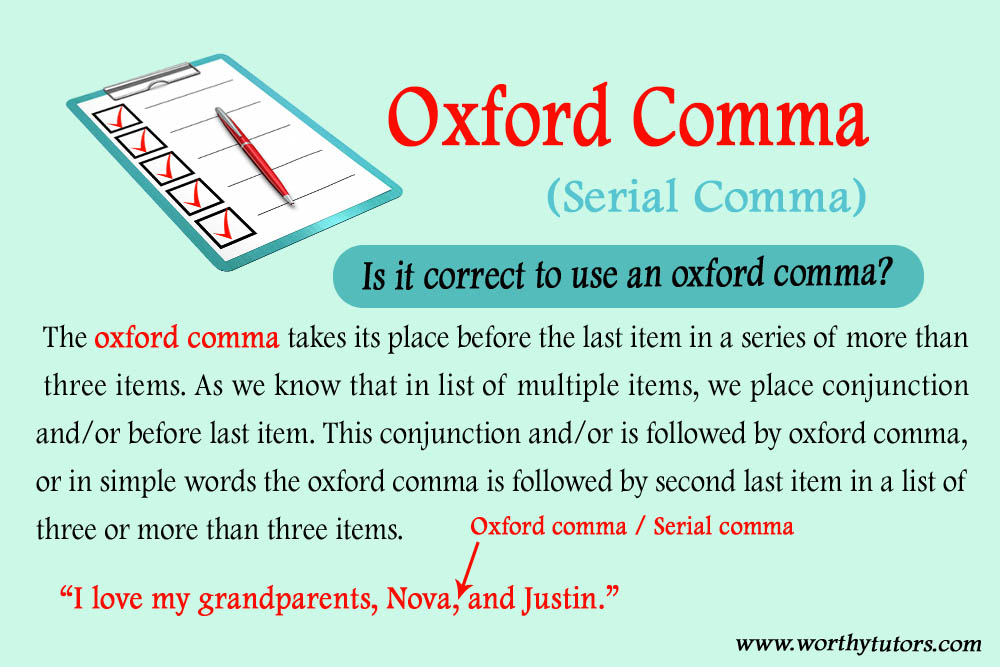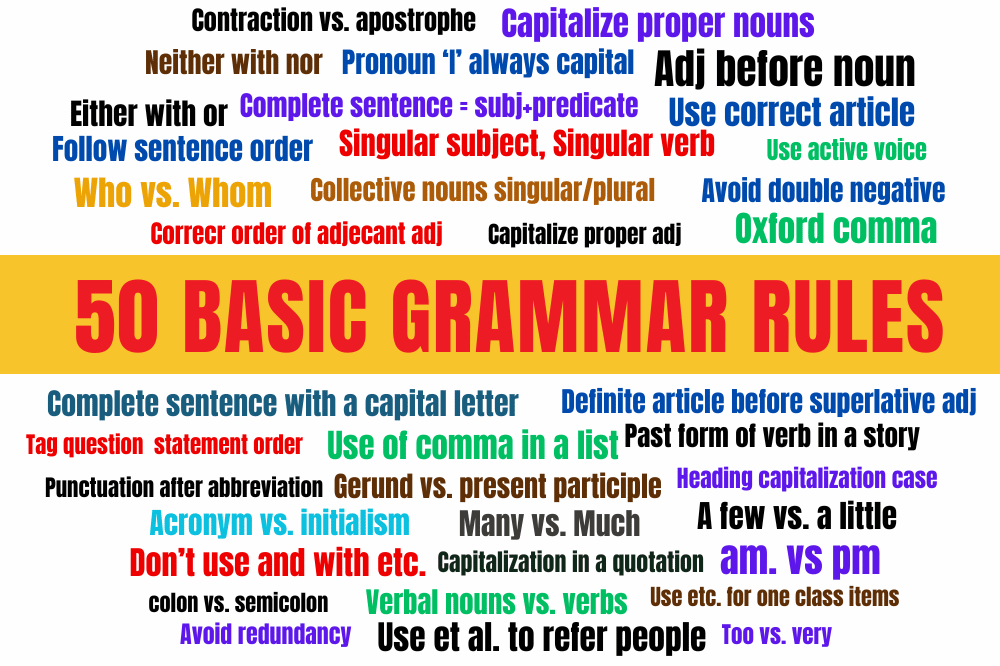
What is an Oxford Comma or Serial Comma?
What is an Oxford Comma or Serial Comma?
In this article, we will cover the basic concept of using oxford comma / serial comma including the rules that apply to it. We will also make it clear that oxford comma is grammatically correct or not. We will try to explain each concept with examples.
The Oxford comma, sometime known as serial comma is one of the most controversial punctuation mark among English grammarian. The Oxford comma or serial comma is just one of many common punctuation rules no one can agree on. In English language punctuation marks, an oxford comma or a serial comma is placed immediately after the second last item in list of three or more items.
Comma is among the smallest punctuation marks but its use is wider than any other punctuation mark. It use is more complex than all the other punctuation marks in English. Therefore, a tiny comma has caused much debate among the grammarian.
What is an oxford comma?
The oxford comma takes its place before the last item in a series of more than three items. As we know that in list of multiple items, we place conjunction and/or before last item. This conjunction and/or is followed by oxford comma, or in simple words the oxford comma is followed by second last item in a list of three or more than three items.
Examples in sentences
Look at the below sentences:
I like juices of apples, bananas, strawberry, and mangoes.
In above example, the comma after strawberry is an oxford comma.
We can write the same sentence without oxford comma and it will make same sense. Look at the below sentence
I like juices of apples, bananas, strawberry and mangoes.
Therefore, both the above sentences are correct. In such simple case, majority is in favor of omitting an oxford comma. But, there are some cases where omitting an oxford comma can cause confusion.
Why you should use oxford comma?
Sometimes people omit its use and sometimes it is necessary to preserve the meaning of the sentence. However, in some cases, omitting a serial comma can cause some strange misunderstandings.
Sometimes, dropping an oxford comma can cause confusion in a sentence. Below is an example of the oxford comma in a sentence to clarify the statement:
Without Oxford comma: “I love my grandparents, Nova, and Justin.”
With Oxford comma: “I love my grandparents, Nova, and Justin.”
In above sentences, dropping the oxford comma/serial comma can create some confusion. Without the oxford comma, it seems that the grandparents are Nova and Justin. With use of oxford comma, it is very clear that Nova and Justin are other people whom I love.
However, grammarian who are against the oxford comma, claim that the writer should change the wording if there is any ambiguity in the sentence. They will prefer to write above sentence in this way.
“I love Nova, Justin and my grandparents.”
In above sentence, there is no oxford/serial comma but the sense of the sentence is still clear.
Is oxford comma grammatically correct?
As mentioned above, the oxford comma is much-debated topic among grammarian. Some believe that the oxford comma is not grammatically correct. However, it does not mean it is wrong to use in a sentence. Moreover, those who are in favor of using it, they consider it correct.
Majority of grammarian is neutral on this debate; they opine that the use of oxford comma is an optional. Moreover, this optional use of comma is accepted among many students and scholars.
Some grammarians consider it a cause of redundancy because its use is fruitless and takes up space on a page. They are in favor to banish it from English language. But, it is universal truth that something under debate get more value and instead of banishing; it emerges. There are still diehard fans of oxford comma and they are reluctant to banish it from English grammar.
Conclusion
There is no need to go in debate of considering it right or wrong. It all depends on your likeness and priorities. Some style guides require you to use it in your sentences as a necessary punctuation mark while some consider it useless, as Associated Press Stylebook considers it unnecessary.
In nutshell, it depends on the style guide you follow. Regardless of what grammarians, English teachers, and your class fellows may think, you won’t need to be worry. You are not breaking any hard rule if you include or omit the Oxford comma in your sentences.
You Might Be Interested In
- Opening and Closing Paragraph in Essay
- What is Precis Writing? Examples of Precis
- Capitalization Rules for Book Titles
- Assignment Writing Tips For Good Marks
- Stunning Facts About English


